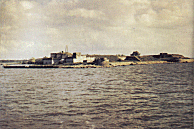 |
|
View to the island of Cronstadt in the Gulf of Finland |
Cronstadt
This small town on the Kotlin Island in the Gulf of Finland is well known all round the world. Long time ago the Neva River, the Gulf of Finland and the Baltic Sea were a trade waterway called "from Vikings to Greece".
Searching for a place to build a sea outpost for the Russian northern capital, Peter the Great in 1704 started a fortress construction, at first called Cronshlot, which means Crown Castle. Military facilities, large harbours, canals, docks and spillways were developed with an astonishing speed. Cronstadt history is tightly connected with Soviet and Russian Navy history.
More than 300 monuments of architecture, history, technology and culture attract tourists attention. They can reach the town by bus, cutters, hydrofoils and yachts. Amusing tours round the forts, organisation of tourists' rest on the islands in the Gulf of Finland, yachting sport development, all these activities welcome you to our town!

Development of "Vodokanal"
The St. Petersburg State enterprise "Vodokanal" with a support of the EBRD and help of European consultants carries out a project of corporate development. The aim of the project is modernisation that enables "Vodokanal" to become an independent enterprise which could offer an effective and quality service.
In July 1997 "Vodokanal" signed a credit agreement with EBRD, as well as with the partners from Great Britain, Denmark, Sweden and Finland. These countries also provide consultancy services. The main partners of "Vodokanal" are "Severn Trent" (UK), Stockholm watercommunication service, Helsinki watercommunication service.
|
The project consists of several steps and will be underway till 2015. It will cause great changes in finance and technical sphere and organisation. There are preliminary results: the program of leakage finding equipment and installation of water-meters for better water utilisation.
Although EBRD hasn't transferred money yet and there is crisis situation in Russia the project has not been stopped because the foreign partners finance all projects running now. It will be difficult to recover the credit due to the rouble devaluation but not only "Vodokanal" should be interested in its corporate changes but also the city of St. Petersburg and Ministry of Natural Resources.
The Naval City of Karlskrona Part of the World's Heritage
In December 1998 UNESCO accepted the naval city of Karlskrona as a World Heritage Area. The World Heritage List contains "natural and cultural properties of outstanding universal value in a rapidly developing world". In the naval port of Karlskrona more than 300 years of history lives on in the most unique way.
When Karlskrona was founded Sweden was a major territorial power. To maintain this position and to display the greatness and glory of the kingdom, Karl XI founded the naval port of Karlskrona in 1680. The top architects in the country were commissioned to draw up plans for the city, and by 1682 there were 2000 men working on its construction.
Karlskrona became a seat of the government in 1683. Although the Swedish empire disintegrated during the first twenty years of the 18 th century, the naval harbour, shipyard, fortifications and city continued to grow. New plans for conquest and new ideas in shipbuilding gave the city new strength and by the end of the 18 th century Karlskrona was the third largest city in Sweden and also her military centre.
The city stopped growing in the early 19 th century but began to expand again with the industrial revolution. The naval base and shipyard in Karlskrona have maintained their status since then.
Today Karlskrona is a modern city, a leader in the field of IT development and more than 10% of those employed work in IT companies.

|
Teledemocracy is coming
The growth of telecommunication technology has turned most of the world into a global village which is increasingly linked in social issues, economics, and of course, democracy. We have to secure and support the democratic process which is vital for all community politicians, institutions and organisations. In that process regional cooperation can play a vital part.
We have to increase consciousness about decision-making. We have to make co-operation more practical so that citizens can understand the real democratic process, and we have to link politicians and citizens with each other by new tools of the information society.
In schools, workplaces, city halls, and everyday life, communication systems have made it possible to create a truly "worldvillage". Government officials across Europe can talk to one another via the new media -enhancing cross-regional cooperation. Citizens can more easily access politicians through e-mail and public information kiosks, and this development has to be strengthened.
The BSR is an economically growing area. It's also a great and broad gateway between the present member states of the EU and the countries in transition in CEE. A telematic network should be built around the Baltic Sea. Essential for any trading region is its infrastructure, and teledemocracy is a growing part of that infrastructure. Regional infrastructure is useful only if it spans national borders, easing cross-country commerce and social contacts.
Kotka is constructing the information society through its own teledemocracy application. Kotka has recently created its own interesting and democratic Kotka Teledemocracy -project (NET for nets). The core is Telematic Municipal Counter (MTC). In the project there are about 90 towns and cities from Finland, Germany, Italy and Spain. The city of Kotka is one of those pioneers in Finland who are developing the substance of the information society. One objective to the future might be to develop a unifying network around the Baltic Sea by the same model.

|



